- Home
- Peter Straub
Mr. X Page 16
Mr. X Read online
Page 16
3 HOW I NEARLY WAS KILLED
30
Neither Nettie nor Clark had seemed heartbroken when I told them not to expect me for dinner. Clark had spent the afternoon sulking over having been kept from checking his traps, and Nettie had not forgiven me for the crime of squandering far too much money on a coffin. After the sales pitch in the display room of Mr. Spaulding’s Heavenly Rest Funeral Home, she drew me into a corner for a lecture on the subject of sensible behavior. Still under the illusion that my decision had to be sensible because it was mine, I reminded Nettie that I was spending my own money on my mother’s burial. She couldn’t argue with that, could she? I should have known better.
Mr. Spaulding’s ambassadorial presence filtered in and out of view, and Clark shifted his shoulders in his conga-player’s shirt and sneered at the velvety carpet. When I took the leather chair before Mr. Spaulding’s desk and made out the check, Nettie muttered in complaint. It occurred to me that my selection of the third-least expensive coffin over the bottom of the line had violated the principle that there was no sense spending money on the dead when you could give it to the living. Any illusions that Nettie did not have designs on my checkbook died when Clark nudged the Buick through the brick pillars at the end of Mr. Spaulding’s drive, turned toward the Commercial Street office of Little Ridge Cemetery, and said, “Sometimes, boy, you have to think of other people, not just yourself.”
My hour and a half with Aunt Joy and Uncle Clarence had been even worse. I went over with the idea that I was performing an act of charity for two old people. I hoped for some information about the interesting figure of Howard Dunstan, and I wanted to see what would happen when I brought up Edward Rinehart. Clarence, remembered as a chipper old party, might still be lively enough to brighten my visit, I thought.
Mindless as an infant, and like an infant oblivious to the stench of his own excrement, Clarence slumped over the leather strap pinning him to his wheelchair. Splotches of dried and drying baby food adorned his shirt. Joy told me that every night at 7:00 she pushed him down the hall to the tub and cleaned him off, although she didn’t know where she found the strength. Clarence was getting along just fine. Joy wished that she could say the same for herself.
We sat in the two chairs that were their living room furniture. As Joy escorted me into her maze and my pity yielded to empty-headed horror, the older, drier fetor I had noticed the previous night gradually overwhelmed Clarence’s atmosphere. Established, ingrained, it seemed as much an aspect of the house as the floorboards and beams. Everything absorbed it, including Joy, who virtually swam in its sea.
The youngest and most diminished of Howard Dunstan’s daughters perched on the edge of her chair and spoke as if she had been saving up the words for decades. There was no point in trying to interrupt her: Joy’s bitterness claimed all the conversational space. Her transparent voice grabbed the oars and rowed straight toward the horizon of the known world. When she had reached it, she kept on rowing. Joy was talking about herself, our family, and Howard Dunstan. She plied her oars, and the dry, inhuman stink of her father’s house carried her forward. Clark’s river-bottom had poured into Joy’s house and coated everything with what he called “the ugly part of nature.” If that was nature, I wanted no part of it.
A flashing crimson hand halted me at an intersection. When my feet stopped moving, my mind filled with the image of Joy perched on a filthy cushion with one bony arm extended toward her husband. I saw what happened next. Blindly, I turned to the left and kept walking. Two blocks down on Pine Street, the next traffic light burned green, enabling me to cross what I half-registered was Cordwainer Avenue.
I barreled along on Pine Street, seeing nothing until a gray-haired giant with the face of a warrior and wearing a red and green dashiki slowed down and stared at me as the distance between us decreased. His expression combined anger and sorrow. I waited for him to speak. At the moment we drew abreast, the giant turned his head but said nothing. The current of tension passing between us snapped almost audibly when we drew apart.
I moved on for another two or three paces, then stopped walking and looked over my shoulder. The man in the dashiki immediately wheeled around.
“Son, you look like shit and sound like a steam engine. Please tell me you’re not about to have a coronary.”
“My mother died this morning.”
“If you don’t start paying more attention to what’s going on around you, you’ll see your momma a lot sooner than you think. Take care of yourself, boy.”
“Okay,” I said, and watched him walk off.
I blotted my face with a handkerchief, leaned against a NO PARKING sign, and closed my eyes. Grief flooded upward from the center of my body like a physical presence. I pressed the handkerchief to my eyes. Grief is an industrial-strength emotion, that’s all I can say. Grief takes care of business, it tells you where you are.
When the onslaught subsided, I took in my surroundings. Parking lots and chain-link fences bordered auto-parts suppliers, die stampers, storage facilities, and other, less identifiable, concerns. Most of the buildings on Pine Street were one-story and none higher than two. With their grimy brick facades and pebble-glass windows, they looked like reductions of larger, more accommodating structures.
Three blocks later, the chain-link fences and empty lots disappeared, and the brick buildings grew closer and taller. Traffic lights sprouted from every corner. I turned left and walked past windows displaying videotapes and liquor bottles. My shirt began to dry out. A street sign told me that I was on Cobden Avenue. I started feeling hungry.
Cars occupied by young couples and groups of teenagers flowed by. After two more traffic lights, Cobden came to an end at a four-lane boulevard and a small, triangular park. I had reached Commercial Avenue, the center of town. I turned right and moved toward what looked like the action. Ahead of me, two couples with the uncomplicated, affable assurance of Midwestern wealth spun out of a revolving door under the attention of an impassive doorman in epaulets and brass buttons. A flushed, fiftyish man said, “Does he know what’s going on? I mean, can you believe that?”
The taller, thinner man he was addressing placed a hand on his shoulder. Gold-rimmed glasses caught the fading sunlight. His rim of white hair had been cropped to a stubble. “You bet I do.” Vertical wrinkles creased his face, and yellow teeth filled his carnivorous smile. “In about five minutes, he’ll believe it, too.”
The dark-haired woman with him said, “Honey, are you going to tell him?” Twenty years younger than the man she called “honey,” she had the aerobicized, face-lifted look of a second wife fighting to stay in the game. She sent me an irritated glare that almost immediately turned into something else, something I could not quite identify but that combined surprise, dismay, and embarrassment.
Her husband’s chesty har har har ridiculed the suggestion of “telling.” “I don’t have to, because, as everybody knows, our friend …” He noticed the look on his wife’s face, glanced at me, and abruptly pulled himself upright. He was at least six foot six, another giant, in a grass-green linen jacket and sharply creased pink trousers. A lot of vibrant colors zigzagged across his bow tie. He was in his early seventies and still an unrepentant bully who thought of himself as a powerhouse.
“Do you require some form of assistance?”
I liked the “require.” It had a nasty edge you couldn’t get from “need.” “Require” put you in your place. “Form” was a nice touch, too.
“I’m looking for a good restaurant. What would you recommend?”
Managing his surprise better than I had expected, he swept his hand toward the building beside us. A bronze plate beside the revolving door read MERCHANTS HOTEL. “Le Madrigal. Right off the lobby. We just had dinner there.” He noticed something about me that stopped him cold, and his smile faded. “It’s pricey, though—pricey. Try Loretta’s, three blocks north. They can fix you up a good steak, ribs, anything you want.”
“The Madrigal sounds
perfect.”
“Lllluuuh Madrigal, not The Madrigal. Around here, it’s where the good people get together.”
The other man said, “I love it when you talk dirty, G-Man.”
“Word of advice, buddy.” The G-Man slammed a big hand down on my shoulder. A silken wing of the bow tie slid across my temple. “You can show off, sure, throw your money around, fine, but stop off at the boys’ room first and make yourself presentable. A polite little fellow like you wants to fit in, am I right?”
I tilted my face toward his leathery ear. “I don’t need your advice, you overbearing small-town shithead.”
Recoiling like a compressed spring, he grabbed his wife’s arm and yanked her into the street. The other couple flapped their mouths and scurried after them. My friend forced himself to go around the front of a dark green Town Car to open his wife’s door while the other couple climbed into the backseat.
For a second or two, the doorman permitted himself to smile at me.
An elderly bellboy directed me up a marble staircase to the men’s room. I washed my hands and face under the regard of the black-suited attendant. I trained the hand dryer’s flow of warm air onto my shirt, reknotted my necktie, and patted my hair. I used the mouthwash and a splash of designer cologne. The attendant remarked an improvement in my appearance, and I contributed two dollars to his porcelain saucer.
On the other side of the lobby, I went up a smaller, carpeted flight of stairs. An illuminated podium and a headwaiter whose name tag identified him as Vincent stood guard before tables with candles and white tablecloths. Vincent brushed his lips with a forefinger to indicate contemplation and conducted me to a table near the bar. He produced a parchment menu and a leather-bound wine list. My waiter’s name would be Julian. A girl who looked like a Norwegian high school student poured ice water into a glass, and a Malaysian sourpuss came by with biscuits and bread sticks. I opened the menu and heard someone speak my name.
Ashleigh Ashton was moving across the room. From the other side of their window table, Laurie Hatch raised her eyebrows and gave me a look that weakened my knees.
31
I ordered salad frisée, a hanger steak, and a glass of cabernet from Julian, a roguish pixie. As for the cabernet, he had a special little something he wanted me to try. If Laurie Hatch saw anything unlikely in Ashleigh’s story of giving me a ride to Edgerton, she kept her reservations to herself. Ashleigh had invited Laurie to dinner by reason of her connection to the legal case, but the connection went unexplained. Julian delivered his special little something and awaited the verdict. I expressed my wonder at the majesty of the little something. Julian asked if the ladies would care for their coffee now, or would they like something else? Now, Ashleigh said, she had to go upstairs to make some calls. Laurie requested a glass of the little something.
“How is your mother doing?” she asked.
“Oh, God,” Ashleigh said. “I promise you, I’ve been thinking about your mother ever since you got out of my car. What was it, anyhow?”
“A stroke,” Laurie said. “What do the doctors say?”
“They say she died this morning. They better be right, because I just bought a coffin and a cemetery plot.” They stared at me in shock. “I’m sorry. I shouldn’t have put it like that. It’s been a weird day.”
Ashleigh said, “At least you were able to spend a whole day with her. Could she talk to you?”
“She was able to say a few things.” For a brief time, I found myself unable to speak. The Malaysian sourpuss removed their plates, and the Norwegian girl refilled our water glasses. Julian scurried up with the coffee and the wine.
Laurie asked, “Are you going to stay around after the funeral?”
“I might. I’d like to see more of the town.”
“Let me be your tour guide. After all, I’m in your debt.”
“Sounds like a great idea,” I said, and made myself stop looking at her. “Ashleigh, what’s happening with your project?” Her reasons for coming to Edgerton had entirely escaped me.
“If I don’t get anywhere in the next day or two, I’ll throw in the towel. The guy lives behind too many walls.”
“That’s Stewart,” Laurie said, explaining everything. “I wish I could have been more helpful.”
Ashleigh gave me a rueful smile. “We spent most of dinner trading dreadful husband tales.”
She had intended to pump her target’s estranged wife, and the estranged wife was more than willing to talk. The next exchange between the women brought another clarification.
“Laurie, you won’t be in any trouble, will you?”
Laurie shrugged. “I don’t care if Stewart knows we had dinner together. Grennie can’t hurt me.”
“Grenville Milton?”
“The one and only Groin Vile,” Laurie said. “And his wife, your mother’s old friend. Plus two other people who think I’m a terrible person. They left about five minutes before you got here.”
“Is Groin Vile a big old bald-headed character in a bow tie and a green linen jacket who thinks he owns the world?”
“You encountered our Grennie,” Laurie said. “I hope he didn’t say anything to you.”
“He told me that I probably wanted to act like a big shot and tip waiters with hundred-dollar bills. Then he advised me to visit the men’s room and spruce up.”
Laurie groaned. “Grenville felt good about it. His state of mind improved no end.”
“It took a turn for the worse when I called him an overbearing small-town shithead.” Laurie laughed, and Ashleigh opened her mouth in a disbelieving half smile. Julian, whom I had not seen approaching, placed my salad before me with only a trace of his former vivacity and retreated. “I must be on a roll,” I said.
“Julian has high moral standards,” Laurie said. “Everyone in Edgerton has high moral standards, except me. If I’d heard you call Grennie a shithead, I would have brightened up immediately. I gather he’s getting ready to dump Rachel. She’s been leaving sad little messages on my answering machine.”
She gave me an apologetic look. “When I married Stewart, Rachel Milton took me under her wing and helped me with the kinds of things she cares about, like finding a good hairdresser and the right caterer. She looked at me and saw herself.”
“Herself?” I said. “Oh, I get it. A younger woman, an outsider …”
Laurie Hatch’s dazzling face opened into beautifully ironic assent. “Rachel was too busy identifying to see that ambition had nothing to do with my marrying Stewart.”
“Ned, let me put your dinner on my bill, will you?” Ashleigh said. “It’s on the state of Kentucky. Laurie, thanks for a nice evening. I’ll call you soon.”
She signed the check. Julian asked if I would like a second glass of wine. Laurie Hatch asked for another, too. Ashleigh pushed her chair away from the table.
I said, “I’ll walk you to the elevator.”
The other patrons watched us wind through the tables.
“I wish Laurie had suggested another restaurant.”
“Didn’t you get what you wanted?”
She smiled. “I called Laurie to see if she could confirm some details. I thought we’d do the whole thing on the telephone, but she said she was free for the evening. Basically, we spent the entire time complaining about our husbands.”
“Better than being alone.”
She tucked in her chin with a sharp little nod and pushed the elevator button. “It must be nice, having a woman like Laurie Hatch waiting for you.”
“I don’t think Laurie has any special plans for me.”
“Don’t be so sure.”
“Ashleigh, when dinner is over, I’m going to walk around for a while. That’s it.”
“You could come back here. I’m in room 554.”
I put my arms around her. “I need some time alone.”
Ashleigh bumped her head against my chest and pulled away. “I’m sorry about your mother.”
The elevator opened onto mahog
any and dark mirrors. Through the half inch of space before the doors closed, I saw her sag against the rear of the car.
32
Vinnie glided a hand toward the far side of the room. I didn’t fool him for a second, but he had to admit I had good moves.
Laurie Hatch looked at me with a relaxed, self-possessed amusement imbued with the innate consciousness that seemed to radiate from her. Julian snapped the cover from my plate and executed an about-face and a formal departure.
“Remember the old Julian? Remember the pixie?”
Laurie’s flickering glance informed me that I had missed the point. “Julian has to wait on Grennie and Rachel at least once a week. He puts up with more innuendos about masculinity than you’ll hear if you live to be a thousand.”
It was like having my windows cleaned, like putting on new eyeglasses. I said, “Ah. Uh-huh,” and cut into the steak.
Her smile changed. “I wish I’d been able to do more for Ashleigh. She’s so smart and dedicated. You two get on very well together.” For a hitchhiker and the person who gave him a ride.
“Ashleigh’s easy to get on with. She wanted to hear more about my mother.”
“I know how it feels to lose your mother. How is your father doing?”
“I wonder.” I smiled at her chagrin. “I never knew my father.”
“Do you know where he is?”
“I didn’t even know his name until yesterday, when my mother told it to me. I thought I might see what I can find out about him. My family isn’t too happy about that.”
“They don’t understand it? Or are they afraid of what you could find out?”
The question startled me. “They act like I’m being outrageous. They won’t talk about things I know they remember.”
“What could they be afraid of?”
“God knows. My family is … let’s say, eccentric.”
I had a memory-flash of Aunt Joy leaning forward and aiming a scrawny forefinger across the room to send Clarence’s wheelchair rolling a yard forward, a yard back. She squinted. The wheelchair floated four feet off the ground and swung from side to side while Clarence pushed his tongue in and out of his mouth in babyish pleasure.

 Poe's Children: The New Horror: An Anthology
Poe's Children: The New Horror: An Anthology Koko
Koko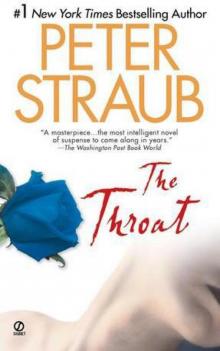 The Throat
The Throat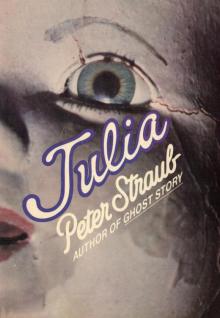 Julia
Julia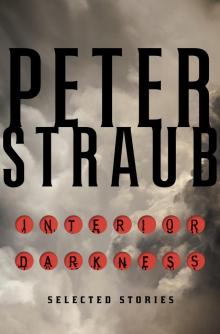 Interior Darkness: Selected Stories
Interior Darkness: Selected Stories A Dark Matter
A Dark Matter Floating Dragon
Floating Dragon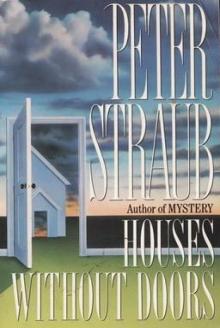 Houses Without Doors
Houses Without Doors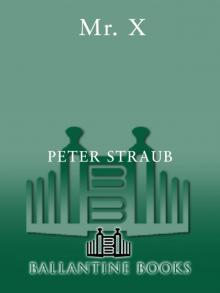 Mr. X
Mr. X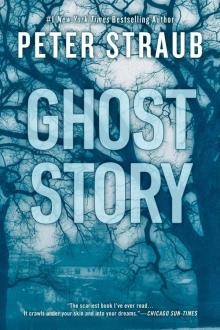 Ghost Story
Ghost Story Mystery
Mystery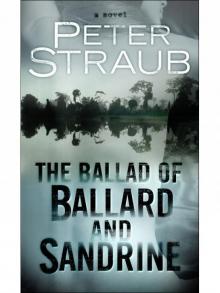 The Ballad of Ballard and Sandrine
The Ballad of Ballard and Sandrine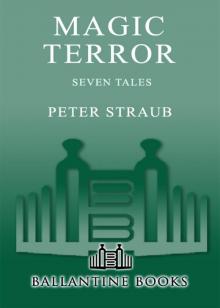 Magic Terror
Magic Terror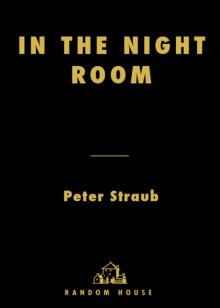 In the Night Room
In the Night Room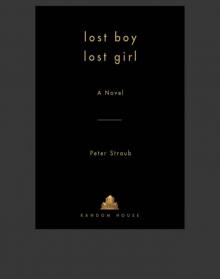 Lost Boy Lost Girl
Lost Boy Lost Girl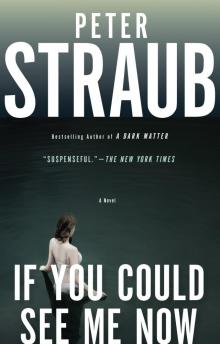 If You Could See Me Now
If You Could See Me Now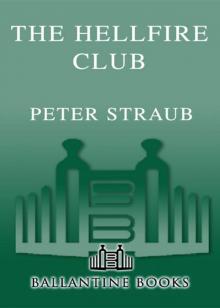 The Hellfire Club
The Hellfire Club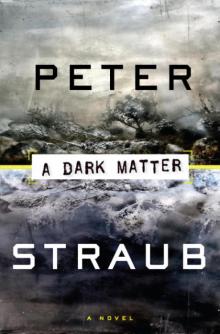 A Dark Matter: A Novel
A Dark Matter: A Novel Koko brt-1
Koko brt-1 Shadowland
Shadowland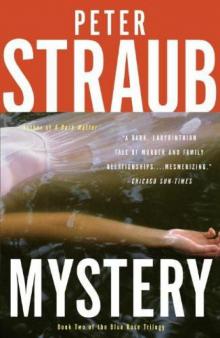 Mystery brt-2
Mystery brt-2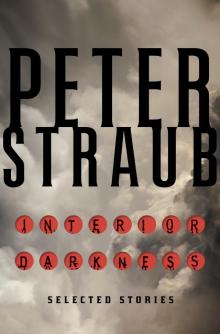 Interior Darkness
Interior Darkness Poe's Children
Poe's Children